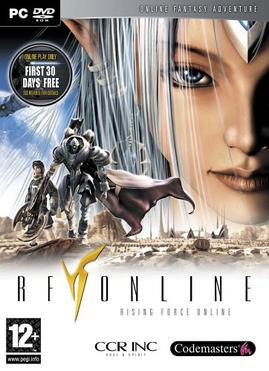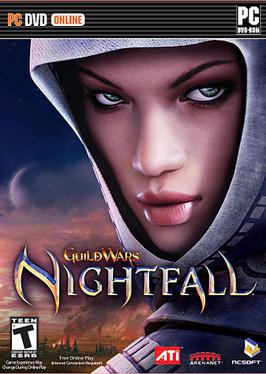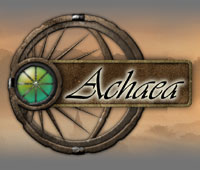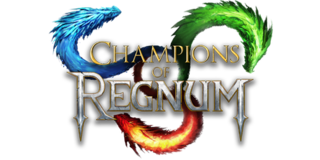A massively multiplayer online role-playing game (MMORPG) is a video game that combines aspects of a role-playing video game and a massively multiplayer online game.

Dark Age of Camelot is a massively multiplayer online role-playing game released in October 2001 in North America, and in January 2002 in Europe. The game combines Arthurian lore, Norse mythology, and Celtic mythology with high fantasy. It is set in the period after King Arthur's death, when his kingdom has split into three realms, which are in a constant state of war with each other. Dark Age of Camelot includes both player versus environment (PvE) and realm versus realm (RvR) combat.
Twinking is a type of behavior in role-playing games that is disapproved of by other players. A player who engages in such behavior is known as a twink. The precise definition of twinking varies depending on the variety of role-playing game:
Player versus player (PvP) is a type of multiplayer interactive conflict within a game between human players. This is often compared to player versus environment (PvE), in which the game itself controls its players' opponents. The terms are most often used in games where both activities exist, particularly MMORPGs, MUDs, and other role-playing video games, to distinguish between gamemodes. PvP can be broadly used to describe any game, or aspect of a game, where players compete against each other. PvP is often controversial when used in role-playing games. In most cases, there are vast differences in abilities between players. PvP can even encourage experienced players to immediately attack and kill inexperienced players. PvP is often referred to as player killing in the cases of games which contain, but do not focus on, such interaction.
Guild Wars is an online role-playing game franchise developed by ArenaNet and published by NCSoft. The games were critically well received and won many editor's choice awards, as well as awards such as "Massively Multiplayer/Persistent World Game of the Year" by the Academy of Interactive Arts & Sciences, as well as Best Value, Best Massively Multiplayer Online Role-Playing Game (MMORPG), and Best Game. Guild Wars was noted for being the "first major MMO to adopt a business model not based on monthly subscription fees", its instanced approach to gameplay, and the quality of the graphics and play for computers with low specifications. In April 2009, NCSoft announced that 6 million units of games in the Guild Wars series had been sold. The sequel and fourth major entry into the series, Guild Wars 2, was announced in March 2007 and released on August 28, 2012. It features updated graphics and gameplay mechanics, and continues the original Guild Wars tradition of no subscription fees. The Guild Wars series had sold 11.5 million copies by August 2015

Warhammer Online: Age of Reckoning was a massively multiplayer online role-playing game based on Games Workshop's Warhammer Fantasy setting, developed by Mythic Entertainment and published by Electronic Arts in 2008. The game revolved around the continual worldwide conflict that the Warhammer Fantasy setting is known for, and the game is geared toward ongoing, constant war laced with dark humour. Age of Reckoning ended up selling over a million copies and peaking at 800,000 subscribers, but dropped to 300,000 subscribers several months later. The game received generally positive reviews from critics but shut down in 2013. Since at least 2014, an active private server called Return of Reckoning has been run by fans, and it remains active as of June 2024.

Mythic Entertainment was an American video game developer based in Fairfax, Virginia that was most widely recognized for developing the 2001 massively multiplayer online role-playing game Dark Age of Camelot. Mythic was a prolific creator of multiplayer online games following its establishment in the mid-1990s.
A persistent world or persistent state world (PSW) is a virtual world which, by the definition by Richard Bartle, "continues to exist and develop internally even when there are no people interacting with it". The first virtual worlds were text-based and often called MUDs, but the term is frequently used in relation to massively multiplayer online role-playing games (MMORPGs) and pervasive games. Examples of persistent worlds that exist in video games include Battle Dawn, EVE Online, and Realms of Trinity.

The Realm Online, originally known as The Realm, is a massively multiplayer online role playing game (MMORPG) launched in December 1996 for Windows PC. It was designed in the tradition of graphical MUDs, before the usage of the terms "massively multiplayer" and "MMORPG".
Player versus environment is a term used for both single player and online games, particularly MMORPGs, CORPGs, MUDs, other online role-playing video games and survival games to refer to fighting computer-controlled enemies - in contrast to PvP which is fighting other players in the game. In survival games a large part may be fighting the elements, controlling hunger and thirst, learning to adapt to the environment and exploration.
A mob, short for mobile or mobile object, is a computer-controlled non-player character (NPC) in a video game such as an MMORPG or MUD. Depending on context, every and any such character in a game may be considered to be a "mob", or usage of the term may be limited to hostile NPCs and/or NPCs vulnerable to attack.

RF Online, originally named 'Rising Force', is a 3D MMORPG developed by CCR. The first version of the game was released in South Korea and was later followed by Chinese (Mandarin), Japanese, Indonesian, Portuguese and English translations. The North American/European version of the game launched its retail phase on February 21, 2006. A mixture of science fiction and classic fantasy, RF Online is set in a distant planet in the Novus system where magic exists alongside high technology. Like most MMORPGs, it follows the typical fantasy setting complete with swords and sorcery, but it also emphasizes the three-way Race vs. Race vs. Race (RvRvR) concept and modern/futuristic technology such as mecha and nuclear weapons.
Dragon's Gate was an interactive, real time, text-based multi user online fantasy role-playing game, sometimes referred to as a MUD. It was one of the longest running pay-for-play online games in the world, it opened to the public in the spring of 1990 on GEnie. In 1996 the game was moved to AOL. Later the game was moved to Mythic Realms, and finally to independent server, where it ran until the summer of 2007.

Guild Wars Nightfall is a fantasy action role-playing game and the third stand-alone campaign in the Guild Wars series developed by ArenaNet, a subsidiary of NCSOFT corporation. Nightfall was released worldwide on October 27, 2006, having been in development alongside Guild Wars Factions since November 2005.

Achaea, Dreams of Divine Lands is a roleplay-focused, text-based multi-user dungeon (MUD) released on September 9, 1997. It was published by Achaea LLC, now known as Iron Realms Entertainment. Achaea is operated by collecting the revenue through a microtransaction system, which allows payment for the acquisition of in-game benefits.

Guild Wars is a multiplayer online action role-playing game developed by ArenaNet, a subsidiary of South Korean game publisher NCSOFT, and released in 2005. As the original installment of the Guild Wars series, its campaign was retroactively titled Prophecies to differentiate it from the content of subsequent releases. The game contains a co-operative role-playing portion and a competitive Player versus Player (PvP) portion. In PvP, players may use either their co-operative characters or PvP-exclusive characters who are inherently maximum level and have account-based access to unlocked content.

Champions of Regnum is a fantasy massively multiplayer online role-playing game (MMORPG) developed and published by Nimble Giant Entertainment, a game development studio located in Argentina. The game focuses on full Realm vs Realm team player vs player combat, with a three-way war constantly in progress over forts and castles. There are monsters and an element of grinding, but these are considered secondary to the war. It was released May 24, 2007.
The history of massively multiplayer online games spans over thirty years and hundreds of massively multiplayer online games (MMOG) titles. The origin and influence on MMO games stems from MUDs, Dungeons & Dragons (D&D) and earlier social games.
World of Warcraft, or WoW, is set in a fictional universe, its primary setting being the planet of Azeroth. The first expansion, The Burning Crusade, introduced a second planet, Outland. Wrath of the Lich King and Cataclysm expanded upon Azeroth and respectively added Northrend, the frigid northern continent of Azeroth, and drastically changed various other continents by destroying some and unveiling new ones. The next expansion, Mists of Pandaria, added Pandaria, the southern continent previously hidden behind a perennial mist cover. Warlords of Draenor introduced the planet of Draenor, a version of Outland in a different timeline before its partial destruction. The Legion expansion took adventurers to the Broken Isles, an island chain near the Maelstrom in the middle of the Great Sea, and the damaged planet Argus, the headquarters of the Burning Legion. The seventh expansion, Battle for Azeroth, added two new island continents to the center of Azeroth: Kul Tiras and Zandalar. The latest expansion, Shadowlands, introduced the eponymous Shadowlands, a realm composed of five major zones: Bastion, Maldraxxus, Ardenweald, Revendreth, and the Maw.

Camelot Unchained is an in-development fantasy massively multiplayer online role-playing game from City State Entertainment which was partially funded through Kickstarter. Leading its production is Mark Jacobs, the former designer of Dark Age of Camelot. Its crowd funding campaign has raised US$4.5 million with Jacobs contributing an additional $5 million from his own assets, and raising an additional $7.5 million from investors, for a total of $17 million. The game is based on its own proprietary game engine engineered for server-side physics and large-scale battles, and as such will focus primarily on open world PVP rather than "theme park" instanced encounters or battlegrounds. Camelot Unchained entered Beta 1 phase on July 31, 2018.









